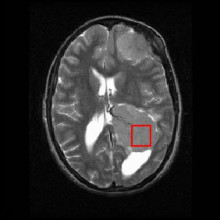We zoom into MRI scanning to find out why it is so low resolution and ask, if it was improved could that help diagnosing disorders of the brain?
In this episode

00:00 - Why are MRI scans such low resolution?
Why are MRI scans such low resolution?
Hannah - So, whilst it might appear that MRI or magnetic resonance imaging pictures are blurry, in fact, they are not. As Paul Thompson, professor of neurology at University of Southern California explains...
Paul - Right now, the scans we use in the hospital can see small strokes and blood vessels as small as 1mm in diameter. The detail is terrific and brain scans can help diagnose cancer and Alzheimer's disease. The detail you can see depends on how long the patient can sit still in the scanner. It can take 5 to 10 minutes to get a brain scan and we can check parts of the brain involved in memory, language, and emotions. With a method called functional MRI, we can also see which parts of the brain are active while you're looking at a picture or speaking. Normally, it's hard to sit still for more than about 10 minutes. So, scientists are working on faster methods to speed up brains scans and get more detail.
Hannah - So, even though we can use MRI to take detailed pictures of brain structures, functional or fMRI looks at the activity of different brain areas by measuring how much oxygen they are using. But because the brain is moving and many measurements are taken over a period of time, the activity maps that fMRI produces tends to be of lower resolution which might explain why John refers to the images as being blurry. So, what about imaging to diagnose brain disorders?
Paul - Brain scans are often used in a hospital to see if a person's brain is damaged, if they've been in an accident or if they have memory loss, that could be a sign of Alzheimer's disease. Also, if a person has a stroke or a brain tumour, we can see clearly what parts of the brain are affected and we can see if the treatment is helping. Brain scans can also be used to plan a surgery that takes out of brain tumour while protecting the rest of the brain.
Hannah - And Paul is also part of one of the largest brain studies in the world called the Enigma Project. 307 scientists have scanned 27,000 people's brains including individuals with psychiatric conditions and results suggest that brain scans like MRI could be useful for distinguishing between Schizophrenia, bipolar and depression in the future. These disorders can sometimes be hard to tell apart clinically, so, this finding may help to diagnose people sooner so that they can receive the correct treatments early on.
- Previous Brainy Babies!
- Next What causes a blood red moon?










Comments
Add a comment